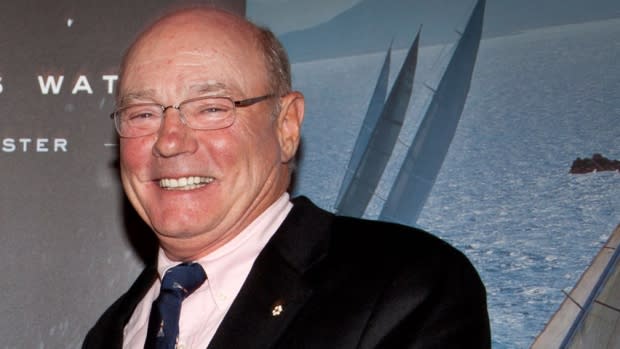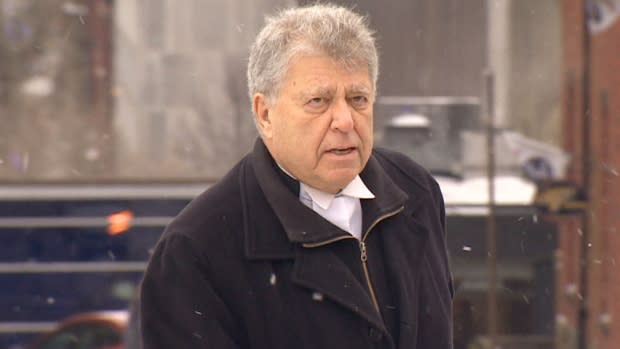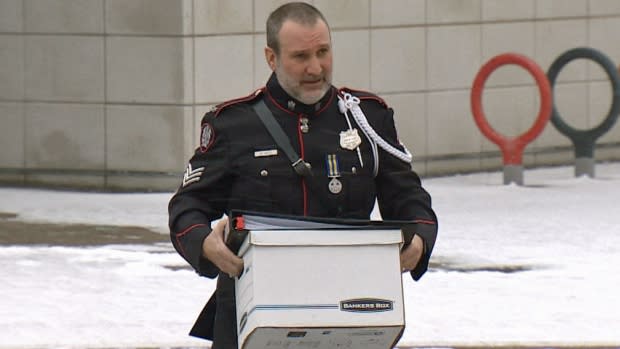Ex-deputy police chief made false statements at Oland murder trial, investigator finds
A former deputy chief of the Saint John Police Force made false statements at Dennis Oland's first murder trial and to Halifax police officers investigating his conduct, an independent investigator hired by the New Brunswick Police Commission found.
Glen McCloskey, a 30-year-veteran of the force, had no active role in the investigation into Richard Oland's homicide in July 2011.
But he walked around the bloody crime scene twice before forensic testing was complete and later encouraged another officer not to tell the court about it, according to the summary of investigator Barry MacKnight's report to the commission.
The report was among stacks of court documents related to Dennis Oland's defence lawyers' fight for third-party records at hearings earlier this year as they prepared for his retrial.
The documents include prosecutors' emails about McCloskey and another officer's tour of the crime scene. They were under a publication ban but became public after it was decided the retrial would go ahead last month without a jury.
The defence has alleged the Crown conspired before the first trial to conceal the fact McCloskey had gone through the crime scene, which officers were trying to keep free of contamination while the head of forensics collected evidence.
Richard Oland, 69 was found dead in a pool of blood in his office at 52 Canterbury St. on the morning of July 7, 2011. The multimillionaire suffered 45 sharp- and blunt-force injuries to his head, neck and hands.
His son, Dennis, 50, who met with the prominent businessman the night before, was found guilty in December 2015 of second-degree murder. His conviction was overturned 10 months later because of an error in the trial judge's instructions to the jury.

MacKnight's report to the police commission stemmed from testimony at Oland's first trial that suggested McCloskey tried to keep his presence at the victim's office unknown to the court.
MacKnight said he found McCloskey committed five breaches of the Police Act: two counts of discreditable conduct, and one count each of deceitful behaviour, neglect of duty, and being party to a breach of the professional code of conduct.
A further allegation of neglect of duty was deemed unsubstantiated.
McCloskey, who is now retired, declined through his lawyer Nathalie Godbout to comment, citing the ongoing court proceedings.

At Dennis Oland's first murder trial, retired Staff Sgt. Mike King testified that in 2014, either before or during the preliminary inquiry, McCloskey told him he didn't "have to" tell anyone he'd entered the crime scene. McCloskey was an inspector at the time and King's supervisor.
King testified he replied to McCloskey that he had "never lied on the stand in 32 years" and he "wasn't about to start."
During his own testimony the next day, McCloskey said he'd never asked anybody to lie under oath. He alleged it was King who lied because he was angry about being passed over for a promotion.
McCloskey said he entered Richard Oland's office twice the day after the homicide — once to "observe the body" and then again out of "curiosity."

He admitted he went farther during his second trip into the crime scene, with Const. Greg Oram, than the head of forensics allowed the first time, and he wore no protective gear.
McCloskey said he noticed some small drops of blood on the floor and he might have touched or even opened the back door, in the foyer outside the office, which Oland's defence lawyers contend would have been the preferred exit for the "killer or killers."
The door was never tested for fingerprints or DNA evidence because it had been contaminated.
Because of the testimony, then-chief John Bates asked the provincial commission to investigate McCloskey's conduct on behalf of the Saint John Police Commission.
Less than a month after starting the job, however, MacKnight recommended suspending his probe and launching a criminal investigation into McCloskey.
"The conduct described could be considered perjury, obstructing justice, or counselling an offence under the Criminal Code," MacKnight, a former Fredericton police chief, wrote to the commission.
"The documents in the possession of the Commission at this time are more than sufficient to lead an ordinary person to believe that a criminal offence may have been committed."

Halifax police were asked to do the criminal investigation and, after eight months, cleared McCloskey in the fall of 2016 of any criminal wrongdoing.
MacKnight resumed his investigation, and his report was submitted in December 2016.
But he was "troubled" no criminal charges were laid against McCloskey, according to notes made by commission executive director Steve Roberge after a meeting with the investigator.
In his report, MacKnight concluded McCloskey "wilfully or negligently" made statements he knew to be false during his testimony at Oland's trial on Oct. 14, 2015, and to Halifax Regional Police during the criminal investigation of his conduct on June 29, 2016, "with intent to deceive, falsify or mislead."
'You don't have to tell them that'
MacKnight said he found that McCloskey and King did have the conversation King described about the senior officer's appearance at the crime scene.
McCloskey used words to the effect of "you don't have to tell them that," the investigator reported.
Any reasonable person would get the impression that McCloskey wanted his crime-scene visit omitted from King's testimony and that the resulting testimony would be untruthful, MacKnight said.
He found McCloskey acted in a manner that would likely hurt the reputation of the force, failed to diligently perform his duties and counselled another member to commit a breach of the code of conduct.
The investigator based his conclusions on his review of the Halifax police criminal investigation, statements from witnesses, a written statement from McCloskey on Nov. 24, 2016, trial transcripts and "other documents."
Defence lawyers suspicious

At a pre-trial conference, lead defence lawyer Alan Gold alleged McCloskey and Oram, now a sergeant, were "purposely" not called to testify at Oland's preliminary inquiry in 2014 so the defence wouldn't get a chance to cross-examine them.
McCloskey and Oram were among the only officers who were not called to testify.
"We were purposely kept in the dark," Gold told Court of Queen's Bench Justice Terrence Morrison.
Gold advised the judge the defence might seek a court order requiring the two officers to testify at the pre-trial hearing so they could be cross-examined "to give back what we should have had but for the purposeful hiding of these witnesses at the time of the preliminary hearing."
'Illicit' email
The defence pointed to an "illicit" email from Crown prosecutor Patrick Wilbur to McCloskey on May 6, 2014.
In the email, Wilbur told McCloskey that he and then-lead prosecutor John Henheffer would run the preliminary inquiry and "skip over" him as a witness.
"Depending upon what S/Sgt. King testifies to (no concerns), as he says you were behind him and he never went beyond the secretary's desk," Wilbur wrote.
"However, Sgt. G. Oram (concerns) — says he went right in all around and into the side/back offices and you were with him … for some portion of that time. But, I will try to limit/contain Oram's testimony so that the [defence] does not know to go there.
"As you know, Oram's Narrative ... is short and lacks any specific details and he has no notes, so maybe we will … get away with it?
"Cannot make the same promise when it comes to Trial. We will have to call you then. I hope this helps."

Wilbur, who handled the preliminary inquiry and Oland's first trial, is not involved in the retrial.
He refused to be interviewed for the Police Act investigation, according to MacKnight, but he gave a statement to Halifax police in May 2016, during the criminal investigation.
He told Halifax police that he knew McCloskey and Oram had gone into the inner crime scene a second time, beyond the limits set by the head of forensic identification.
But the decision not to call McCloskey to testify at the preliminary inquiry was based on the "minor nature of his evidence" and on personal issues, including recent deaths and illness in the family, that the officer was dealing with, Wilbur said.

Mark Heerema, a senior Crown attorney in Nova Scotia, who had been advising Halifax police during their investigation, flagged Wilbur's email in a letter to New Brunswick's director of public prosecution services.
Halifax police had "an unease with the contents" of the Wilbur email and sought guidance, Heerema wrote to Luc Labonté on July 22, 2016.
"On its face this email causes us concern as well. It may be construed as an attempt by the Crown Attorney to suppress potentially hurtful information to its case."
Heerema also drew Labonté's attention to a statement Oram made to Halifax police on May 6, 2016, which appeared to be inconsistent with his earlier accounts and "with the testimony of Insp. McCloskey at trial."
"Namely, Sgt. Oram suggests that he and Insp. McCloskey had much more extensive involvement and movements within the crime scene … than was testified to by Insp. McCloskey or are evident in either of their notes/narratives."
Prosecutor tries to explain
Three days after Heerema's email, Wilbur wrote an email, copied to Labonté, that explained his choice of words and the decision not to call McCloskey as a witness.
McCloskey had asked if it was necessary for him to testify at the preliminary inquiry, Wilbur said, and "seeing that he did not do anything nor touch anything when he was at or in the office … it was determined" he needn't be called.
At that time, prosecutors did not know of any possible contamination issues related to the "back door" at the crime scene, Wilbur said.
Oram "at no time said or suggested that either he or Insp. McCloskey touched/moved/examined anything within the office, but they had simply walked around," the prosecutor said.
Wilbur said he was aware of the possibility of contaminated evidence, and he and Henheffer knew access to the crime scene was "a major concern."
Forensics officer 'frustrated'
The prosecutors also knew that the head of forensics, Sgt. Mark Smith, would testify that when he returned to the crime scene, he saw McCloskey and Oram in the office, beyond the previously designated limited area and had told them to, "Get out."
Smith seemed frustrated by their "unauthorized" presence at the crime scene but "did not indicate that he saw them doing anything else, except enter," Wilbur said.
Wilbur's reference to trying to "limit/contain" Oram's testimony meant he would ask only the questions necessary to establish his role and presence at the scene, he said.
If Oram said he had been in the scene with McCloskey, beyond the "authorized" area, "then I could not nor would I, try to prevent him from testifying to same."

The "maybe we will get away with it" in his email, Wilbur said, "refers to not calling Insp. McCloskey at the [preliminary inquiry]. Period. Nothing more."
"At no time prior to Ret. S/Sgt. Mike King's disclosure to the Crown during the trial, was there any suggestion or discussion by anyone to me of any counselling to commit perjury/ altering evidence, by any person and or Police Officer involved in this matter."
Henheffer, who stepped down as lead prosecutor on the Oland case weeks before the 2015 trial for health reasons and has since retired, answered in a similar vein when asked about Wilbur's email to McCloskey.
He said Wilbur's reference to getting away with it "relates to … whether Inspector McCloskey would be needed to testify at the Preliminary. There is nothing more to this."
McCloskey expected to testify
The existence of Wilbur's email and Oram's statement to Halifax police was disclosed to the defence on July 28, 2016, the day before its written submissions were due to be filed with the Court of Appeal on Oland's appeal of his conviction.
McCloskey was scheduled to face an arbitration hearing with the commission in October, but he retired in April. The matter was dropped because the police watchdog only has the authority to discipline active officers.
He is expected to testify at Oland's retrial in the new year.
The provincial commission spent a total of $61,573.82 on the McCloskey file, according to associate director Jill Whalen.

